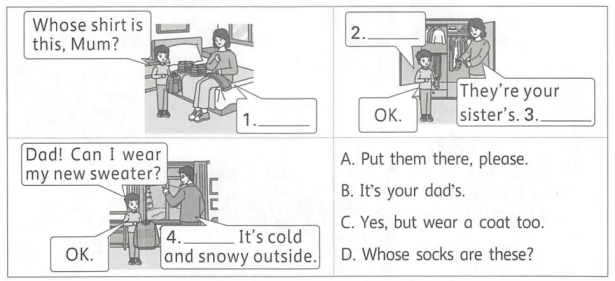相关试卷
-
1、
A. can B. can't
(1)、The library is closed. We read books in it.(2)、There is a new film on. We go and see it. -
2、 It's hot. We can ____ in the pool.A、swim B、swims C、swimming
-
3、 It is (A. snowy B. snow) outside. Let's play in the snow.
-
4、 It's (A. rain B. raining) in Shanghai now.
-
5、 — Is it warm in Xi' an? — ____ It's only 2 degrees.A、Yes, it is. B、No, it isn't. C、No, it doesn't.
-
6、 — ____ it cold in Beijing? — No, it isn't.A、Are B、Be C、Is
-
7、— What's the weather like in Qingdao? (根据图片写答语)
—

-
8、 — ____ is the weather like in Sydney? — Well, it's quite sunny today.A、Which B、What C、How
-
9、如果你想知道多伦多的天气怎么样,你应该说:____A、Is it cold in Toronto? B、What's the weather like in Toronto?
-
10、给别人打电话介绍自己的身份时,你应该说:____A、Hello, Sarah. B、This is Sarah speaking.
-
11、 — ____ Mike speaking. — Hello, Mike.A、I am B、This is C、That is
-
12、 Read and choose. Jack 分享了选择衣物的日常,选择合适的选项补全他与家人的对话。(只填序号)

-
13、 Read and choose.同学们搭配衣物时会询问衣物的归属并征求家人的建议。选出相应的问句或答语,补全对话。(只填序号)
A. It's mine.
B. It's cold outside.
C. Whose shirt is this?
D. Whose socks are these?
(1)、— — It's your brother's.(2)、— Can I wear the sweater? — Yes.(3)、— Whose coat is this, Sarah?—(4)、— — They' re your mum's. -
14、 Read and choose.根据同学们对日常衣物的讨论,选择合适的图片。
 (1)、These socks are Amy's.(2)、Wear a coat. It's so cold outside.(3)、This shirt is Jack's. Put it there, please.(4)、— Whose sweater is this, Mum?
(1)、These socks are Amy's.(2)、Wear a coat. It's so cold outside.(3)、This shirt is Jack's. Put it there, please.(4)、— Whose sweater is this, Mum?— It's your dad's.
-
15、
A. yellow
B. green
C. black
D. blue
E. white
a.

b.

c.

d.

e.






-
16、 Listen and judge. 听同学们日常对穿衣搭配的讨论,判断句子正误。(1)、The pink shirt is Amy's.(2)、The blue sweater is Dad's.(3)、It's hot today. Lily can wear her dress.(4)、These socks are Sarah's.(5)、It's cold outside. Jack needs to wear a coat.
-
17、 Listen and number. 听 John 对同学们衣物的介绍,用A~E给下列图片排序。





-
18、 (新语篇·漫画图解)阅读水循环相关科普,在图片中两处空白的地方画出对应天气的简笔画,将水循环过程补全。

Do you know the water cycle? It's the movement of water on, above and below the surface of the earth. There are four steps of the water cycle.
1. Evaporation(蒸发): The sun heats the ocean water and turns. some of it into vapour(水蒸气).
2. Condensation(冷凝): The vapour gathers and turns into clouds.
3. Precipitation(降水): Clouds move around in the sky and fall back to the earth as rain or snow.
4. Storage(储藏): The precipitation is absorbed(吸收) by the ground or bodies of water.
词汇积累: visit v. 参观 tip n. 贴士 remember v. 记住 especially adv. 尤其
March n. 三月 April n. 四月 movement n. 运动 surface n. 表面
-
19、 (新素养·文化意识)阅读短文,选择合适的选项。
Before you come to visit Britain, you should know something about this country. People here are usually friendly and helpful. Here are some tips.
●Remember to bring an umbrella(伞) or a raincoat(雨衣). Britain is famous for its rainy weather. Especially in March and April, it rains a lot.
●You should always say"please" and"thank you" when you ask for something.
●Don't jump the queue(插队), or other people will not be pleased. Wait in line.
(1)、The writer tells us something about ____ .A、America B、Canada C、Britain(2)、How is the weather in March there?A、It's warm. B、It's rainy. C、It's snowy.(3)、You should say"____" when somebody shows you the way.A、sorry B、thank you C、no(4)、How many tips does the writer give us?A、Two. B、Three. C、Four.(5)、Which of the following sentences is TRUE?A、You can't ask people in Britain for help. B、People like to jump the queue in Britain. C、It's often rainy in Britain. -
20、 (新情境·传统文化)阅读《后羿射日》的故事,完形填空。
There are 1 suns in the sky. They make the weather very 2 . The earth is dry. Plants can't grow. Animals 3 live long. People live a hard life. They don't have enough food 4 drinks. Then, there is a strong 5 named Hou Yi. He is good at shooting. To save people, he shoots nine suns out of the sky. In the end, there is only 6 sun in the sky. The 7 becomes nice. Plants start to 8 . People are happy and grateful. They think this man is a great hero.
词汇积累: chicken n. 鸡肉 earth n. 土地;地球dry adj. 干的,干涸的enough adj. 足够的 shoot v. 射击 in the end 最后 savev. 拯救grateful adj. 感激的 hero n. 英雄
知识点拨: be good at+动名词(doing)表示"擅长某种技能或活动",例如: He is good at playing football.他很擅长踢足球。
(1)A 、 ten B 、 one C 、 nine(2)A 、 cold B 、 hot C 、 windy(3)A 、 can B 、 does C 、 can't(4)A 、 or B 、 but C 、 and(5)A 、 woman B 、 man C 、 men(6)A 、 two B 、 one C 、 ten(7)A 、 plant B 、 earth C 、 weather(8)A 、 grow B 、 go C 、 die